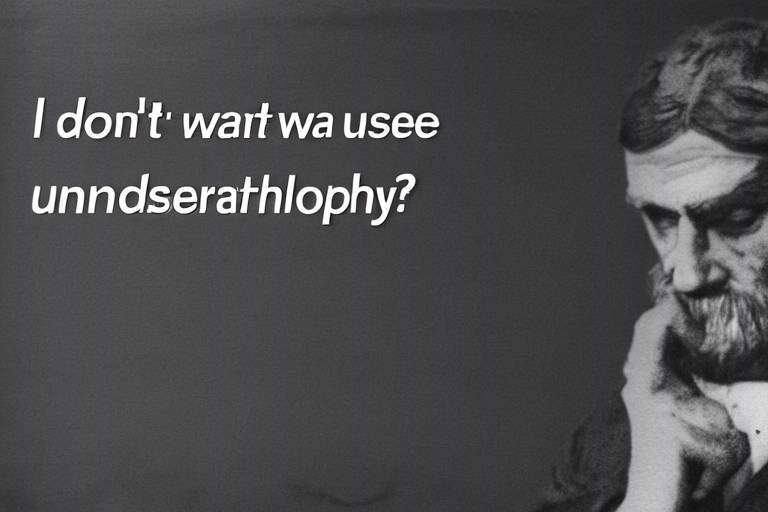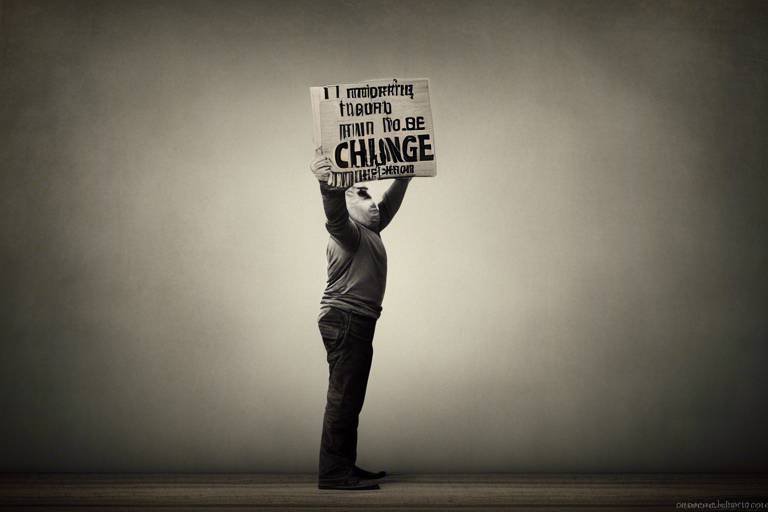What is the Purpose of Understanding Philosophy?
Understanding philosophy is like opening a door to a vast world of thought and inquiry. It invites us to ponder the **fundamental questions** that shape our existence: Why are we here? What is the nature of reality? How should we live? Philosophy is not just an abstract discipline confined to dusty books in libraries; it is a vibrant field that influences our daily lives, decisions, and interactions. By delving into philosophical thought, we can gain a clearer perspective on our values, beliefs, and the world around us.
At its core, philosophy encourages **critical thinking**. It teaches us to analyze arguments, question assumptions, and discern truth from falsehood. Imagine walking through a dense forest; without a map or compass, it’s easy to get lost. Philosophy serves as that map, helping us navigate through the complexities of life. It empowers us to make informed decisions rather than simply accepting the status quo. In a world overflowing with information, the ability to think critically is more vital than ever.
Moreover, philosophy provides a framework for **ethical reasoning**. Every day, we face choices that test our morals and values. Whether it’s deciding how to treat others, what policies to support, or how to engage with societal issues, philosophical principles guide us in making those tough calls. It’s like having a moral compass that not only points north but also helps us understand the terrain we’re navigating. By studying different ethical theories, we can better understand the implications of our choices and develop a more profound sense of responsibility.
Philosophy also plays a pivotal role in the **search for meaning**. In a fast-paced world where distractions abound, many of us find ourselves asking, “What’s the point?” Engaging with philosophical questions helps us explore our purpose, understand our place in the universe, and reflect on what truly matters in life. It's akin to looking at the stars on a clear night; it reminds us of the vastness of existence and our small, yet significant, role within it.
In essence, understanding philosophy is not merely an academic exercise; it is a **transformative journey** that enriches our lives. It sharpens our reasoning, enhances our ethical framework, and deepens our understanding of existence. As we grapple with life’s most profound questions, philosophy encourages us to think deeply, act ethically, and live authentically. So, why not embark on this journey? The insights gained could very well illuminate the path ahead.
- What is philosophy? Philosophy is the study of fundamental questions regarding existence, knowledge, values, reason, and the mind. It encourages critical thinking and ethical reasoning.
- How can philosophy improve my life? Philosophy enhances critical thinking skills, helps in ethical decision-making, and provides a framework for understanding life's purpose.
- Is philosophy relevant today? Absolutely! Philosophy is relevant in various fields including politics, ethics, science, and personal development.
- What are some key philosophical theories? Important theories include utilitarianism, deontology, and virtue ethics, each offering unique perspectives on morality and decision-making.

The Role of Philosophy in Critical Thinking
Philosophy is often seen as a lofty discipline, reserved for the realms of academia and intellectual debate. However, its true power lies in its ability to sharpen our critical thinking skills. Imagine navigating through life without a map; that's what it feels like to make decisions without the tools that philosophy offers. By engaging with philosophical concepts, individuals learn to analyze arguments critically, identify logical fallacies, and make reasoned decisions that can significantly impact their lives.
At its core, critical thinking is about questioning assumptions and evaluating evidence. Philosophy teaches us to dig deeper, to not just accept things at face value. For instance, when faced with a claim, a critical thinker will ask, "What evidence supports this? Are there any counterarguments?" This is where philosophical training truly shines. It encourages us to approach problems with a skeptical yet open mind, allowing us to dissect complex issues and arrive at well-founded conclusions.
One of the most significant contributions of philosophy to critical thinking is the development of logical reasoning. Logic is the backbone of philosophical inquiry, and it equips individuals with the tools to construct coherent arguments and deconstruct flawed ones. By studying logic, we learn to recognize patterns in reasoning, which can be applied in various contexts, from casual conversations to professional debates. This skill is invaluable, as it not only enhances our ability to argue effectively but also protects us from falling prey to misinformation and deceit.
Moreover, philosophy encourages an open-minded approach to discussions. It fosters an environment where diverse perspectives can be examined and understood. In a world that often feels polarized, the ability to appreciate differing viewpoints is essential. Philosophy teaches us that every argument has its merits and flaws, and by engaging with opposing ideas, we can refine our understanding and develop more nuanced positions. This practice of respectful discourse is crucial in both personal relationships and public discussions, allowing for more productive and meaningful exchanges.
To illustrate the impact of philosophy on critical thinking, consider the following table that outlines some of the key skills developed through philosophical training:
| Critical Thinking Skill | Description |
|---|---|
| Analytical Skills | Ability to break down complex arguments and identify their components. |
| Logical Reasoning | Understanding and applying principles of logic to evaluate arguments. |
| Open-Mindedness | Willingness to consider and engage with diverse perspectives. |
| Problem-Solving | Using philosophical methods to approach and resolve ethical dilemmas. |
In conclusion, the role of philosophy in critical thinking is profound and far-reaching. By enhancing our analytical abilities, fostering logical reasoning, and promoting open-mindedness, philosophy equips us with essential skills that are applicable in every aspect of life. Whether we are making personal decisions, engaging in debates, or simply trying to understand the world around us, the insights gained from philosophical inquiry can illuminate our path and empower us to think more clearly and critically.
- What is critical thinking? Critical thinking is the ability to analyze information and arguments logically and to make reasoned decisions based on that analysis.
- How does philosophy improve critical thinking? Philosophy enhances critical thinking by teaching individuals to question assumptions, analyze arguments, and recognize logical fallacies.
- Can anyone learn critical thinking skills? Yes, critical thinking skills can be developed through practice and engagement with philosophical concepts and discussions.
- Why is open-mindedness important in critical thinking? Open-mindedness allows individuals to consider different perspectives, which can lead to a deeper understanding of complex issues.

Philosophy and Ethical Decision-Making
Understanding philosophy is like unlocking a treasure chest filled with tools that help us navigate the complex world of ethical decision-making. Imagine standing at a crossroads, where every path represents a different moral choice. Philosophy offers a map, guiding us through the often murky waters of right and wrong. It's not just about knowing what is ethical; it's about understanding *why* certain choices are deemed right or wrong. This deeper understanding fosters a sense of responsibility and clarity in our decisions, allowing us to act with conviction.
At its core, philosophy provides a framework for ethical reasoning, equipping individuals with the skills to evaluate situations critically. When faced with a moral dilemma, philosophical principles encourage us to step back and analyze the implications of our choices. Are we considering the consequences of our actions? Are we adhering to a set of moral laws? These questions are central to ethical decision-making and can often lead to more thoughtful and informed outcomes.
Philosophy also challenges us to think beyond our immediate interests and consider the broader impact of our decisions. This is particularly important in today's interconnected world, where our actions can have ripple effects far beyond our immediate surroundings. By engaging with philosophical concepts, we can develop a more holistic understanding of our responsibilities to others and the environment. For example, when making business decisions, a philosophical approach might lead us to consider not just profit margins but also the ethical implications of our practices on employees, consumers, and the planet.
Moreover, philosophy encourages dialogue and debate, which are essential for ethical development. Engaging with diverse perspectives helps us to refine our own beliefs and understand the complexities of different ethical frameworks. This is where philosophical inquiry shines, as it promotes critical discussions that can illuminate various aspects of moral issues. For instance, when discussing topics like climate change or social justice, philosophical discussions can help clarify the values at stake and the ethical obligations we have to future generations.
In summary, the intersection of philosophy and ethical decision-making is a dynamic and enriching space. By embracing philosophical inquiry, we empower ourselves to make choices that are not only informed but also aligned with our values and the greater good. Whether in personal life or professional settings, the principles of philosophy can guide us toward a more ethical existence, reminding us that every decision we make contributes to the larger tapestry of human experience.
- What is the role of philosophy in ethical decision-making?
Philosophy helps individuals analyze moral dilemmas, providing frameworks and principles that guide ethical reasoning and decision-making.
- How does philosophical inquiry improve our understanding of ethics?
By encouraging critical thinking and dialogue, philosophical inquiry allows us to explore different ethical perspectives and refine our moral beliefs.
- Can philosophy influence real-world decisions?
Absolutely! Philosophical principles can shape policies, business practices, and personal choices, impacting society on various levels.

Major Ethical Theories
When we delve into the world of ethics, we find ourselves navigating a complex landscape filled with diverse theories and principles. These theories serve as the compass guiding our moral decisions and shaping our understanding of right and wrong. Among the most prominent ethical theories are utilitarianism, deontology, and virtue ethics. Each of these frameworks offers unique perspectives on how we should act and the reasoning behind our choices.
Utilitarianism is perhaps the most straightforward of the ethical theories. It posits that the morality of an action is determined by its outcomes. Essentially, an action is considered right if it produces the greatest happiness for the greatest number of people. This principle can be likened to a balancing scale, where the benefits of an action must outweigh its drawbacks. For instance, in a public policy context, a utilitarian approach might advocate for a decision that maximizes overall welfare, even if it means sacrificing the interests of a few. However, the challenge lies in accurately predicting outcomes and weighing different people's happiness, which can lead to contentious debates.
On the other hand, deontology takes a different stance. This ethical theory emphasizes the importance of duty and adherence to rules. According to deontologists, some actions are inherently right or wrong, regardless of their consequences. Imagine a world where honesty is the unyielding law; a deontologist would argue that telling the truth is a moral obligation, even if lying could lead to better outcomes in certain situations. This unwavering commitment to moral rules can lead to conflicts, especially when duties clash. For example, if telling the truth could harm someone, a deontologist must grapple with the implications of their commitment to honesty.
Then we have virtue ethics, which shifts the focus from actions and rules to the character of the individual. This theory suggests that moral behavior stems from developing good character traits or virtues, such as courage, compassion, and integrity. Virtue ethics encourages individuals to cultivate these qualities, promoting a holistic approach to ethics that encompasses personal growth and moral development. Imagine a gardener nurturing a plant; just as a gardener tends to a plant to help it flourish, individuals must nurture their virtues to lead a fulfilling and ethical life. This perspective emphasizes that being a good person is just as important as making good choices.
Each of these ethical theories offers valuable insights into our moral landscape. They challenge us to think critically about our motivations, the consequences of our actions, and the kind of people we aspire to be. By understanding these theories, we can better navigate the complexities of ethical decision-making in our daily lives and contribute to the broader moral discourse in society.
In summary, the exploration of major ethical theories not only enriches our understanding of morality but also equips us with the tools to face ethical dilemmas with confidence. Whether we lean towards utilitarianism's focus on outcomes, deontology's commitment to duty, or virtue ethics' emphasis on character, each theory provides a framework for making sense of our moral choices.
- What is the main idea behind utilitarianism? Utilitarianism advocates for actions that maximize happiness for the greatest number of people.
- How does deontology differ from utilitarianism? Deontology focuses on the morality of actions themselves, regardless of the outcomes, emphasizing duties and rules.
- What is virtue ethics? Virtue ethics emphasizes the importance of developing good character traits to lead a moral life.
- Can these ethical theories be applied in real-life situations? Yes, understanding these theories can help individuals navigate complex moral dilemmas in their personal and professional lives.

Utilitarianism: The Greatest Happiness Principle
Utilitarianism is a fascinating ethical theory that revolves around the idea of maximizing happiness and minimizing suffering. At its core, this principle suggests that the best action is the one that results in the greatest good for the greatest number of people. Imagine a scenario where you have to decide whether to allocate a limited budget to education or healthcare. A utilitarian approach would analyze which option yields the most significant overall benefit to society. This method of thinking is not just about individual pleasure; it encompasses the well-being of the community as a whole.
One of the most compelling aspects of utilitarianism is its simplicity and practicality. It encourages us to consider the consequences of our actions, making it a powerful tool in ethical decision-making. For instance, when faced with a moral dilemma, a utilitarian would weigh the potential outcomes, asking questions like: Will this decision enhance happiness? Will it cause more harm than good? This analytical framework not only sharpens our decision-making skills but also fosters a sense of responsibility towards others.
However, the application of utilitarianism is not without its challenges. Critics argue that it can lead to morally questionable outcomes. For example, if sacrificing one person could save many, a strict utilitarian might endorse that action, raising ethical concerns about justice and individual rights. This is where the debate becomes rich and complex. It forces us to confront uncomfortable truths about the nature of morality and the often conflicting interests of individuals versus the collective.
To better understand how utilitarianism operates in practice, consider the following table that outlines its key components:
| Key Components | Description |
|---|---|
| Happiness | The ultimate goal; maximizing overall well-being. |
| Consequences | Focus on the outcomes of actions rather than intentions. |
| Impartiality | Each person's happiness counts equally in the decision-making process. |
In contemporary discussions, utilitarianism remains relevant across various fields, including politics, economics, and healthcare. Policymakers often utilize this framework to justify decisions that impact large populations. For instance, during a public health crisis, a government might prioritize measures that benefit the majority, such as vaccination programs, even if it means imposing restrictions on individual freedoms temporarily. This illustrates the delicate balance utilitarianism seeks to maintain between collective welfare and personal rights.
In summary, while utilitarianism provides a robust framework for evaluating ethical dilemmas, it challenges us to think critically about the implications of our choices. It encourages us to look beyond our immediate desires and consider the broader impact of our actions. As we navigate the complexities of life, embracing this principle can lead to more thoughtful, compassionate decision-making that ultimately contributes to a happier society.
- What is the main idea of utilitarianism? Utilitarianism is the ethical theory that promotes actions that maximize happiness and minimize suffering for the greatest number of people.
- How does utilitarianism influence decision-making? It encourages individuals to consider the consequences of their actions, assessing which choice will yield the most benefit to society.
- What are some criticisms of utilitarianism? Critics argue that it can justify morally questionable actions, such as sacrificing an individual for the greater good, and may overlook important issues of justice and rights.

Deontology: Duty-Based Ethics
Deontology, often referred to as duty-based ethics, is a fascinating branch of moral philosophy that emphasizes the importance of rules and duties in ethical decision-making. Unlike consequentialist theories, which focus primarily on the outcomes of actions, deontology asserts that the morality of an action is determined by whether it aligns with a set of rules or duties. This concept can be likened to following a strict recipe in cooking; no matter how delicious the outcome may be, if you deviate from the prescribed steps, you may end up with a dish that doesn't meet the intended standards. In the same way, deontological ethics insists that adherence to moral laws is paramount, regardless of the consequences that may arise.
One of the most influential figures in deontological ethics is the German philosopher Immanuel Kant. His categorical imperative serves as a cornerstone for understanding this ethical framework. Kant proposed that we should act only according to that maxim which we can will to become a universal law. This means that before taking an action, we should ask ourselves whether we would want everyone to act in the same way. If the answer is no, then the action is deemed unethical. This principle encourages individuals to consider the broader implications of their actions, fostering a sense of responsibility that transcends personal gain.
Deontological ethics is particularly relevant in today's complex moral landscape, where individuals often face challenging decisions that require a clear moral compass. For instance, consider a scenario where a whistleblower must decide whether to expose unethical practices within their organization. A deontologist would argue that the duty to tell the truth and uphold integrity outweighs the potential negative consequences, such as job loss or legal repercussions. This steadfast commitment to duty can provide clarity and direction in situations that may otherwise feel morally ambiguous.
However, it's essential to acknowledge that deontology is not without its criticisms. Critics argue that a rigid adherence to rules can lead to morally questionable outcomes. For example, if a person is faced with the decision to lie to protect someone's life, a strict deontologist might argue that lying is inherently wrong, regardless of the situation. This highlights a potential limitation of deontological ethics: the inability to accommodate the nuances of real-life dilemmas where moral duties may conflict.
In summary, deontology offers a compelling framework for ethical decision-making that prioritizes duties and moral laws. By encouraging individuals to act according to universal principles, it fosters a sense of accountability and integrity. Yet, as with any ethical theory, it is crucial to consider its limitations and the complexities of human experience. Ultimately, understanding deontology enriches our ethical toolkit, providing valuable insights into the nature of morality and the importance of upholding our duties.
- What is deontology? Deontology is an ethical theory that emphasizes the importance of following moral rules and duties when making decisions, rather than focusing solely on the consequences of actions.
- Who is the main philosopher associated with deontological ethics? Immanuel Kant is one of the most influential philosophers associated with deontological ethics, known for his concept of the categorical imperative.
- What are the strengths of deontological ethics? Deontology provides a clear framework for ethical decision-making, emphasizing integrity and accountability regardless of the outcome.
- What are some criticisms of deontological ethics? Critics argue that strict adherence to rules can lead to morally questionable outcomes, particularly in complex situations where duties may conflict.

Philosophy's Influence on Political Thought
The relationship between philosophy and political thought is as intricate as a spider's web, with each strand representing different ideologies and theories that have shaped governance throughout history. Philosophy provides the foundational principles that guide political systems, influencing how societies are structured and how power is exercised. From the ancient Greeks to modern thinkers, philosophical ideas have sparked revolutions, inspired constitutions, and even justified tyrannies. But what exactly is this influence, and how does it manifest in our political landscape?
At its core, political philosophy grapples with questions about justice, rights, and the role of the state in citizens' lives. Think of it as a toolbox for understanding the complexities of governance. For instance, the concept of social contract theory, championed by philosophers like John Locke and Jean-Jacques Rousseau, suggests that governments derive their legitimacy from the consent of the governed. This idea has been pivotal in shaping democratic principles, emphasizing that individuals have rights that must be protected by the state.
Moreover, the influence of philosophical ideas extends to various political ideologies, including liberalism, conservatism, socialism, and anarchism. Each of these ideologies can be traced back to philosophical roots, which provide a lens through which we can analyze current political events. For example:
- Liberalism advocates for individual freedoms and equality, drawing on Enlightenment thinkers like John Stuart Mill.
- Conservatism emphasizes tradition and social stability, often referencing the works of Edmund Burke.
- Socialism focuses on collective ownership and social welfare, influenced by Karl Marx's critiques of capitalism.
- Anarchism challenges the legitimacy of state power, with roots in the thoughts of philosophers like Mikhail Bakunin.
This philosophical underpinning is not merely academic; it has real-world implications. The way we perceive justice, equality, and freedom affects our voting behavior, public policy, and even international relations. For instance, during the civil rights movement, philosophical arguments about equality and justice were paramount in rallying support against systemic oppression. Activists invoked the principles of famous philosophers to argue for their rights and challenge the status quo.
As we navigate the complexities of modern governance, the interplay between philosophy and political thought continues to evolve. Contemporary issues like climate change, digital privacy, and social justice are often debated through a philosophical lens, prompting us to reconsider our values and priorities as a society. The questions raised by these issues echo the timeless inquiries of philosophers: What is the right thing to do? How should we balance individual rights with the common good? These are not just theoretical musings; they are essential to crafting policies that resonate with the moral fabric of our communities.
In summary, the influence of philosophy on political thought is profound and far-reaching. It shapes our understanding of governance, informs our political ideologies, and guides our ethical considerations in public life. As we engage with these ideas, we not only honor the legacy of past thinkers but also equip ourselves to tackle the pressing challenges of our time.
- How does philosophy influence modern political systems?
- Philosophy lays the groundwork for political ideologies and principles, helping to shape laws and governance structures based on concepts of justice, rights, and the role of the state.
- What are some key philosophical ideas that have shaped political thought?
- Key ideas include social contract theory, justice, individual rights, and the balance between freedom and authority. These concepts have been pivotal in forming various political ideologies.
- Can philosophy help us solve current political issues?
- Yes, philosophical inquiry encourages critical thinking and ethical reasoning, which can provide insights into addressing complex political challenges like inequality, climate change, and governance.

Philosophy and the Search for Meaning
Philosophy is like a compass in the vast wilderness of existence, guiding us through the maze of life’s most profound questions. Why are we here? What is our purpose? These are not just idle musings; they are the core inquiries that philosophy seeks to unravel. When we engage with these questions, we embark on a journey that challenges our assumptions and expands our understanding of ourselves and the world around us.
At its heart, philosophy encourages us to dig deeper into our beliefs and values. It invites us to reflect on our experiences and consider how they shape our understanding of meaning. For instance, think about moments in your life that felt significant—perhaps a personal triumph, a heart-wrenching loss, or a simple act of kindness. Philosophy asks us to analyze these moments, to question why they hold such weight in our lives. This reflective practice can lead to greater self-awareness and a clearer sense of purpose.
Many philosophical traditions explore the concept of meaning from various angles. Existentialism, for example, posits that meaning is not something handed to us on a silver platter but rather something we must create for ourselves. This school of thought emphasizes personal choice and responsibility. Imagine standing at a crossroads, where each path represents a different life choice. The existentialist perspective suggests that the act of choosing is what imbues our lives with meaning. It’s a powerful reminder that we are the architects of our own destinies.
Moreover, philosophy offers tools to navigate the complexities of existence. It encourages critical thinking, helping us to sift through the noise of societal expectations and external pressures. By engaging with philosophical ideas, we can better articulate our values and make choices that resonate with our authentic selves. This process often involves grappling with questions that have no clear answers, which can be both daunting and liberating. After all, the search for meaning is a deeply personal journey, and it’s okay to embrace the uncertainty that comes with it.
Philosophy also intersects with other disciplines, such as psychology and sociology, enriching our understanding of meaning in a broader context. For example, psychological theories about well-being often align with philosophical inquiries about happiness and fulfillment. By examining these connections, we can gain a more holistic view of what it means to lead a meaningful life. In this sense, philosophy serves as a bridge, linking abstract thought to practical application in our everyday lives.
Ultimately, the search for meaning through philosophy is an ongoing dialogue—a conversation between our inner selves and the world around us. It’s a quest that invites us to question, to explore, and to grow. As we engage with philosophical ideas, we may find that the journey itself is as significant as any destination. So, the next time you ponder your purpose, remember that philosophy is there to guide you, offering insights that can illuminate your path.
- What is the main goal of philosophy? Philosophy aims to explore fundamental questions about existence, knowledge, values, and reason, helping individuals find meaning and understanding in their lives.
- How does philosophy help in personal growth? By encouraging self-reflection and critical thinking, philosophy helps individuals understand their beliefs, make informed decisions, and develop a clearer sense of purpose.
- Can philosophy influence my everyday life? Absolutely! Engaging with philosophical ideas can shape your values, enhance your decision-making skills, and improve your overall well-being.

Existentialism and Personal Freedom
Existentialism, a philosophical movement that emerged in the 20th century, places a profound emphasis on the individual's experience, freedom, and responsibility. It challenges us to confront the essence of our existence and the choices we make. Imagine standing at a crossroads, with each path representing a different life choice. Existentialism encourages us to take ownership of our decisions, no matter how daunting they may seem. This philosophy argues that we are not merely products of our environment or fate; instead, we are the architects of our own lives.
One of the core tenets of existentialism is the idea of personal freedom. This freedom is not just about the ability to choose but also about the weight of those choices. With great freedom comes great responsibility. Think of it like being handed the keys to a car: you can drive wherever you want, but you must also navigate the roads safely and responsibly. Existentialists like Jean-Paul Sartre famously stated, "Existence precedes essence," suggesting that we create our own essence through our actions and choices. This notion can be liberating yet terrifying, as it places the burden of meaning squarely on our shoulders.
Existentialism also prompts us to confront the absurdity of life. Life can often feel chaotic and devoid of inherent meaning, leading to feelings of anxiety and despair. Yet, rather than succumbing to these feelings, existentialists argue that we should embrace the absurdity and create our own meaning. This is akin to finding beauty in a messy painting; the chaos can evoke emotions and provoke thought, allowing us to interpret it in our own unique way.
Furthermore, existentialism encourages individuals to seek authenticity in their lives. This means living in accordance with one’s true self rather than conforming to societal expectations. It’s like wearing a mask that fits perfectly; while it may be comfortable, it doesn’t reflect who you really are. Authentic living requires courage and introspection, pushing us to ask ourselves tough questions: What do I truly want? What values do I hold dear? By answering these questions, we can cultivate a life that resonates with our genuine selves.
In the context of personal freedom, existentialism also highlights the importance of relationships. While we are ultimately responsible for our own choices, our interactions with others can significantly influence our paths. Existentialist thinkers like Simone de Beauvoir emphasized that our freedom is intertwined with the freedom of others. This interconnectedness means that while we strive for personal freedom, we must also respect and acknowledge the freedom of those around us. It’s a delicate balance, much like a dance where each partner must be aware of the other’s movements to create harmony.
In conclusion, existentialism offers a profound lens through which we can examine our personal freedom. It challenges us to embrace our choices, confront the absurdity of life, and seek authenticity in our existence. By doing so, we can navigate the complexities of life with a sense of purpose and responsibility. Ultimately, the journey of understanding existentialism is not just about philosophy; it’s about discovering who we are and how we want to live in a world that often seems chaotic and unpredictable.
- What is existentialism? Existentialism is a philosophical movement that focuses on individual freedom, choice, and the search for meaning in a seemingly indifferent universe.
- How does existentialism relate to personal freedom? Existentialism emphasizes that individuals are responsible for creating their own essence through the choices they make, highlighting the importance of personal freedom and the weight of those choices.
- Who are some key figures in existentialist philosophy? Notable existentialist philosophers include Jean-Paul Sartre, Simone de Beauvoir, and Albert Camus, each contributing unique perspectives to the movement.
- Can existentialism help with anxiety and despair? Yes, by encouraging individuals to confront the absurdity of life and create their own meaning, existentialism can provide a framework for coping with feelings of anxiety and despair.

Philosophy's Impact on Science and Knowledge
Philosophy has served as the bedrock upon which the edifice of modern science is built. It is not merely an abstract discipline; rather, it plays a pivotal role in shaping our understanding of how we acquire knowledge and the methods we use to investigate the world around us. When you think about it, science is fundamentally about asking questions, and who better to guide us in questioning than philosophers? They challenge us to consider the nature of knowledge, the limitations of human understanding, and the criteria for what constitutes valid evidence.
One of the most significant contributions of philosophy to science is the development of epistemology, which is the study of knowledge itself. Epistemology tackles questions such as: What is knowledge? How do we know what we know? What are the limits of our knowledge? These inquiries are crucial for scientists, as they help define the parameters of scientific inquiry. For instance, the scientific method—a systematic way of learning about the world—owes its structure to philosophical principles that dictate how we should observe, hypothesize, and test our ideas.
Moreover, philosophical discussions about scientific realism and anti-realism have profound implications for how we interpret scientific theories. Scientific realism posits that the world described by science is real and exists independently of our perception, while anti-realism suggests that scientific theories are merely useful instruments for predicting observations. This debate influences how scientists approach their work and how they communicate their findings to the public.
Furthermore, philosophy encourages a critical examination of the ethical implications of scientific advancements. As we delve deeper into fields such as genetics, artificial intelligence, and biotechnology, philosophical inquiry helps us navigate the moral landscapes these technologies create. Questions arise: Should we edit the genes of future generations? What responsibilities do we have toward artificial intelligences we create? These are not merely scientific questions; they are deeply philosophical ones that require careful contemplation.
To illustrate the intersection of philosophy and science, consider the following table that highlights key philosophical questions and their scientific counterparts:
| Philosophical Question | Scientific Counterpart |
|---|---|
| What is the nature of reality? | What is the universe made of? |
| How do we know what we know? | What is the scientific method? |
| What is the meaning of life? | What are the origins of life? |
| What are our ethical obligations? | What are the implications of scientific discoveries? |
In conclusion, the impact of philosophy on science and knowledge cannot be overstated. It provides the framework for critical thinking, encourages rigorous questioning, and fosters ethical considerations in scientific practice. As we continue to explore the mysteries of the universe, philosophy will remain an invaluable guide, illuminating the path of inquiry and understanding. So, the next time you ponder a scientific question, remember that philosophy is right there, waiting to help you unpack the complexities of knowledge itself.
- Why is philosophy important for scientists? Philosophy helps scientists clarify their assumptions, refine their methods, and consider the ethical implications of their work.
- How does philosophy influence scientific progress? By questioning the foundations of knowledge, philosophy encourages scientists to think critically and expand the boundaries of inquiry.
- Can philosophy and science coexist? Absolutely! They complement each other, with philosophy providing the conceptual tools that enhance scientific understanding.
- What role does ethics play in science? Ethics guides scientists in making responsible decisions about their research and its impact on society.
Frequently Asked Questions
- What is the main purpose of studying philosophy?
The main purpose of studying philosophy is to enhance our understanding of fundamental questions about existence, ethics, and knowledge. It encourages critical thinking and helps individuals develop a framework for making reasoned decisions in life.
- How does philosophy improve critical thinking skills?
Philosophy improves critical thinking skills by teaching individuals to analyze arguments, identify logical fallacies, and evaluate evidence. This training fosters better reasoning abilities, enabling people to make sound judgments and decisions.
- What role does philosophy play in ethical decision-making?
Philosophy provides a framework for ethical reasoning, helping individuals navigate complex moral dilemmas. By understanding various ethical theories, people can make informed choices that align with their values and societal norms.
- Can you explain the key ethical theories in philosophy?
Sure! The key ethical theories include:
- Utilitarianism: Focuses on outcomes and seeks the greatest happiness for the greatest number.
- Deontology: Emphasizes duty and adherence to moral rules regardless of the consequences.
- Virtue Ethics: Centers on the character of the moral agent and the importance of developing good traits.
- How has philosophy influenced political thought?
Philosophy has profoundly shaped political ideologies and governance throughout history. Philosophers have explored concepts like justice, rights, and the role of the state, influencing how societies structure their political systems.
- What does philosophy say about the search for meaning in life?
Philosophy addresses fundamental questions about existence and purpose, offering insights that help individuals find meaning in their lives. It encourages deep reflection on personal values, beliefs, and the nature of reality.
- What is existentialism and how does it relate to personal freedom?
Existentialism is a philosophical movement that emphasizes individual choice and freedom. It encourages people to take responsibility for their actions and live authentically, highlighting the importance of personal agency in finding meaning.
- How does philosophy impact science and knowledge?
Philosophy plays a crucial role in shaping scientific inquiry and epistemology. It raises fundamental questions about the nature of knowledge, the scientific method, and the ethical implications of scientific advancements.



















